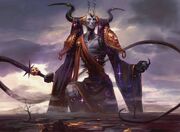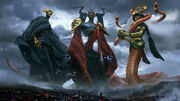When the sun first shone on Heliod, god of the sun, the first shadow was cast. When Heliod saw it, he feared and banished it, sending it beyond the so-called Rivers That Ring the World, the five rivers that form a boundary between Theros and its Underworld. That shadow became Erebos, the god of death. In time, Erebos accepted his role, knowing that although Heliod had banished him, he would always stand behind the sun god.
Erebos rules over death and the Underworld, but these aren't his only duties. Because of his own origins, he is also the god of misfortune, ill fate, begrudging acceptance, envy, and bitterness. And because he is lord of the Underworld, where gold is common and valueless, he is also the god of wealth.
Although it might seem as though Erebos is connected to Nyx more closely than the other gods, this isn't the case. Erebos's realm lacks both the sun and the night.
Erebos wields Mastix, a golden-handled whip with an impossibly long lash, like a thin shadow that stretches on forever. The whip is a means of inflicting pain when he must, but its more frequent function is as a snare to pull the reluctant dead into—or back into—his realm.
Erebos is an effective warden and lord of the Underworld realm. He is not without compassion, but his compassion is limited to feeling on behalf of others what he himself feels, and his acceptance of his fate means that his lieges, the dead, must accept theirs. He idly envies the sunlit world of the living, but only in a daydream-like way. He knows that all mortal souls will eventually join him, which affords him a kind of satisfaction and certainty. When others suffer, it brings Erebos peace, but not glee, because the alienation and banishment of others enables them to identify with his own.
The god of the underworld is worshipped by three distinct sets of mortal beings: those who exalt death, those who desire wealth, and those who pray for acceptance of their fates. The first group is the smallest but most dangerous; they seek to bring about a confrontation between Heliod and his shadow. The second group is largest. Because the dead leave their earthly wealth behind, Erebos has become associated with that wealth, as well as with the abundance of (to him, pretty but valueless) gold in his realm. The final group is closest to Erebos's heart—those who have been cast out and who seek peace with their fate.
To members of the cult of Erebos, gold-infused tattoos symbolize the inevitable grasp of the god of death.
Priests of Erebos give an occasional reminder to mortals who have forgotten their mortality. Erebos's minions hunt the Returned and warn those who consider the same folly.
"Ask of Keranos that you may understand the stars that mark your destiny. Implore Erebos that you may accept the fate thus divulged." (Divination)
Proud Alkmenos, who would not bow to Erebos in death, is now bowed by his own hubris for all eternity. (Weight of the Underworld)
"I take no pleasure in your suffering, but it is necessary. Once you accept your fate you'll find eternity more tolerable." (Dictate of Erebos)
Phenax offers the hope of life, while Pharika grants the solace of death. Between them stands Erebos, who promises nothing but eternity. (Extinguish All Hope)

